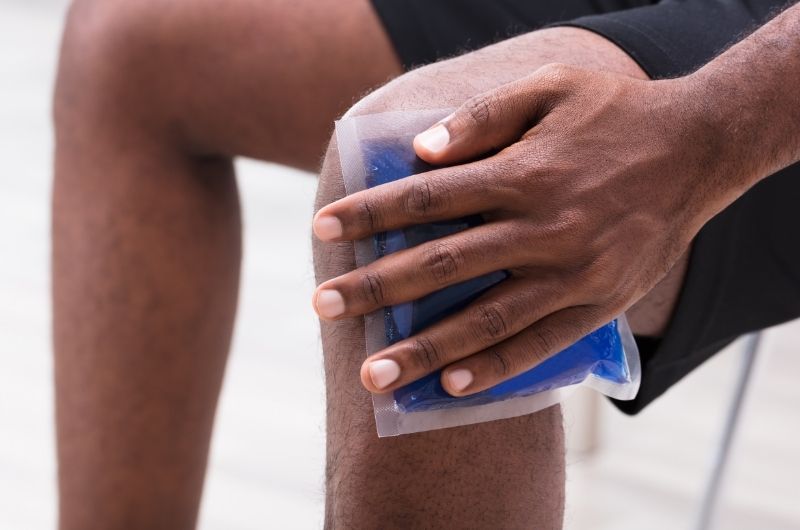There are many possible reasons why you would feel cold or numb (paresthesia) in some parts of your body, which are caused by pressure being put on nerves. Some examples are sitting or standing in one position for a long time, sitting with your legs crossed, or falling asleep on your arm, but once you move, the numbness should get better. If it doesn’t get better, it could be a symptom of a disease or injury.
It is common to feel numb or cold in certain parts of your body for a short period of time, and the blood circulation should go back once you move.
If it doesn’t, it’s time to observe and seek help from your local healthcare providers to prevent more serious complications.
Let’s look at the various causes of why you would feel coldness or numbness on one side of your body.
Causes of feeling cold or numbness

1. Medication
Nerve damage (neuropathy) can be a side effect of several different medications, especially those that treat cancer.
It can affect both your hands and feet.
Other medications that can cause numbness are:
- Antibiotics (metronidazole, nitrofurantoin, and fluoroquinolones)
- Anticancer drugs (Cisplatin and vincristine)
- Antiseizure drugs (phenytoin)
- Heart or blood pressure drugs (amiodarone and hydralazine)
2. Injury
Some of the injuries that could cause numbness are the ones that affect the nerve in your neck or a herniated disc in your spine.
Placing pressure on a nerve is a common cause.
- Carpal tunnel syndrome
- Scar tissue
- Enlarged blood vessels
- Tumor
- Meralgia paresthetica
3. Diseases
Sometimes the cold feeling or numbness is a symptom of an underlying disease like:
- Diabetes
- Multiple sclerosis
- Stroke or transient ischemic attack (mini-stroke)
- Seizures
- Underactive thyroid (hypothyroidism, Hashimoto’s thyroiditis)
4. Inflammation
Because inflammation can lead to changes in blood vessels, blood flow to an affected area may become restricted.
In some types of vasculitis, this may lead to nerve problems, such as tingling, numbness, and weakness.
When to see a doctor?

If, besides the cold and numbness, you feel any of the symptoms listed below, please call your doctor and seek medical attention.
- Back, neck, or head injury
- Inability to walk or move
- Loss of consciousness, even if only for a short time
- Feelings of confusion or trouble thinking clearly
- Slurred speech
- Vision problems
- Feelings of weakness or severe pain
- Losing control of your bowels or bladder
Home remedies to consider
1. Rest
Many of the conditions that cause numbness, such as nerve pressure, improve with rest.
2. Ice
Ice can help reduce swelling that puts pressure on nerves.

Apply cold compresses or wrapped icepacks to numb legs and feet for 15 minutes at a time several times daily.
3. Heat
Heat can sometimes help loosen stiff, sore, or tense muscles that can put pressure on nerves and cause numbness.
However, avoid overheating the numb part of the body, as this may worsen inflammation and cause more pain and numbness.
4. Massage
Massaging the numb part of your body helps improve blood flow and may reduce symptoms.
5. Exercise
lack of proper exercise can weaken the heart and blood vessels, reducing their ability to pump blood to the lower limbs.
Activities such as yoga, Pilates, and tai chi can promote blood flow and reduce chronic inflammation or pain.
6. Supportive devices
Braces and specially designed footwear can help reduce nerve pressure caused by conditions such as injury, tarsal tunnel syndrome, or flat feet.
7. Epsom salt baths
This contains magnesium, a compound known to increase blood flow and circulation. Epsom salts are available for purchase online.
8. Mental techniques and stress reduction
People with conditions that cause chronic numbness, such as MS and fibromyalgia, should try to focus on the fact that the periods of numbness are often short-lived and go away on their own.
Stress also tends to make the symptoms of central nervous system disorders worse.
9. Sleep
Any chronic conditions associated with leg and feet numbness are known to worsen with a lack of proper sleep.
10. Balanced diet
Malnutrition, especially vitamin B deficiencies, can cause nerve damage leading to numbness.
Getting enough vitamins and other nutrients can also reduce chronic inflammation and pain, which can cause numbness.
11. Avoid/reduce alcohol
Alcohol contains toxins that can cause nerve damage and numbness.
Alcohol also usually makes chronic pain and inflammatory conditions worse and can even cause flare-ups of symptoms.
FAQs
Can low blood pressure cause cold hands and feet?
Some symptoms occur when the body tries to increase low blood pressure.
For example, when arterioles constrict, blood flow to the skin, feet, and hands decreases.
These areas may become cold and turn blue.
How can I increase blood circulation in my hand?
Increase cardiovascular exercise, eat iron-rich food or take iron supplements, minimize stress, and include more omega-3 fatty acids in your diet.
These are just some of the few ways to help your blood circulation increase.
Conclusion
There is a certain degree and duration where coldness or numbness is normal.
If it’s something you should be concerned about, listen to your body, especially if you are genetically more prone to diseases that could lead to coldness/numbness symptoms.
When in doubt, always feel free to call your doctor or consult your local healthcare provider to avoid more serious damage.


